UFA GmbH, shortened to UFA, is a film and television production company that unites all production activities of the media conglomerate Bertelsmann in Germany. The original UFA was established as Universum-Film Aktiengesellschaft on December 18, 1917, as a direct response to foreign competition in film and propaganda. UFA was founded by a consortium headed by Emil Georg von Stauß, a former Deutsche Bank board member. In March 1927, Alfred Hugenberg, an influential German media entrepreneur and later Minister of the Economy and Minister of Agriculture and Nutrition in Adolf Hitler's cabinet, purchased UFA and transferred ownership of it to the Nazi Party in 1933.

Sound-on-film is a class of sound film processes where the sound accompanying a picture is recorded on photographic film, usually, but not always, the same strip of film carrying the picture. Sound-on-film processes can either record an analog sound track or digital sound track, and may record the signal either optically or magnetically. Earlier technologies were sound-on-disc, meaning the film's soundtrack would be on a separate phonograph record.
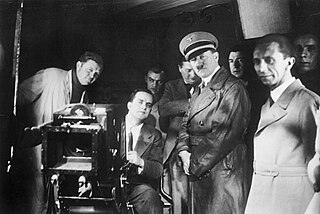
Nazism made a very extensive use of the cinema throughout its history. Though it was a relatively new technology, the Nazi Party established a film department soon after it rose to power in Germany. Both Adolf Hitler and his propaganda minister Joseph Goebbels used the many Nazi films to promote the party ideology and show their influence in the burgeoning art form, which was an object of personal fascination for Hitler. The Nazis valued film as a propaganda instrument of enormous power, courting the masses by means of slogans that were aimed directly at the instincts and emotions of the people. The Department of Film also used the economic power of German moviegoers to influence the international film market. This resulted in almost all Hollywood producers censoring films critical of Nazism during the 1930s, as well as showing news shorts produced by the Nazis in American theaters.
The Tri-Ergon sound-on-film system was developed from around 1919 by three German inventors, Josef Engl (1893–1942), Joseph Massolle (1889–1957), and Hans Vogt (1890–1979).

Die Deutsche Wochenschau is the title of the unified newsreel series released in the cinemas of Nazi Germany from June 1940 until the end of World War II, with the final edition issued on 22 March 1945. The co-ordinated newsreel production was set up as a vital instrument for the mass distribution of Nazi propaganda at war. Today the preserved Wochenschau short films make up a significant part of the audiovisual records of the Nazi era.
Wien-Film GmbH was a large Austrian film company, which in 1938 succeeded the Tobis-Sascha-Filmindustrie AG and lasted until 1985. Until 1945 the business was owned by the Cautio Trust Company, a subsidiary of the German Reichsfilmkammer, and was responsible for almost the entire production of films in the territory of the Ostmark, as Austria was called at that time.
Parufamet was the name of a distribution company established by the American film studios Paramount Pictures and Metro-Goldwyn-Mayer (MGM) and the German UFA GmbH in 1925.
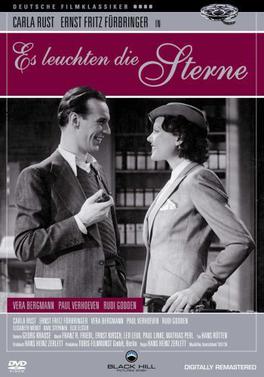
The Stars Shine is a 1938 German musical revue directed by Hans H. Zerlett and written by Zerlett and Hans Hannes.
Terra Film was a Berlin-based film production company. Founded in 1919, it became one of Germany's largest film production companies in the 1930s under the Nazi regime.
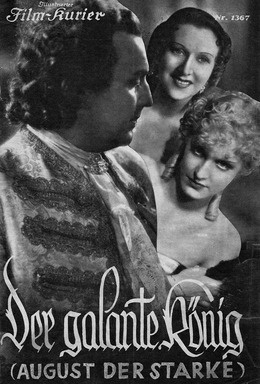
Augustus the Strong is a 1936 German-Polish biographical film directed by Paul Wegener and starring Michael Bohnen, Lil Dagover, and Marieluise Claudius. The film depicts the life of Augustus the Strong, the Eighteenth Century ruler of Saxony and Poland. It was partly shot at the Grunewald Studios in Berlin. The film's sets were designed by the art directors Karl Machus and Ludwig Reiber.

Bavaria Studios are film production studios located in Munich, the capital of the region of Bavaria in Germany, and a subsidiary of Bavaria Film.
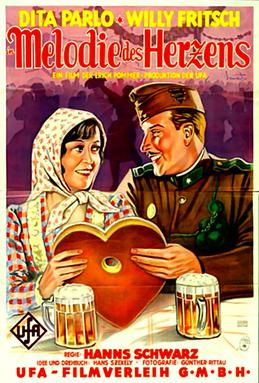
Melody of the Heart is a 1929 German musical film directed by Hanns Schwarz and starring Dita Parlo, Willy Fritsch and Gerő Mály.

Tobis Film was a German film production and film distribution company. Founded in the late 1920s as a merger of several companies involved in the switch from silent to sound films, the organisation emerged as a leading German sound studio. Tobis used the Tri-Ergon sound-on-film system under the Tobis-Klang trade name. The UFA production company had separate rights to the Tobis system, which it used under the trade name of Ufa-Klang. Some Tobis films were released in Germany by the subsidiary Europa Film.
National Film or National-Film was a German film production and distribution company which operated during the silent and early sound era. In the early 1920s it made an attempt to take over Erich Pommer's Decla-Bioscop, but the projected merger failed and Decla instead joined with the major studio UFA. While Decla was generally in favour of joining with National, it was pressured by its creditors Deutsche Bank to merge with UFA.

Aafa Film or Aafa-Film was a German film production and distribution company which operated during the 1920s and 1930s. Established in 1920 as Radio-Film the company was controlled by the producer Gabriel Levy and the director Rudolf Dworsky. The company was one of the leading producers of the Weimar Republic, and survived the transition from silent to sound film in 1929. It made the first German full sound film It's You I Have Loved that year. During the early 1930s Aafa produced a number of mountain films directed by Arnold Fanck. It also made a multi-language version musical Lieutenant, Were You Once a Hussar? (1930).

The Tempelhof Studios are a film studio located in Tempelhof in the German capital of Berlin. They were founded in 1912, during the silent era, by German film pioneer Alfred Duskes, who built a glass-roofed studio on the site with financial backing from the French company Pathé. The producer Paul Davidson's PAGU then took control and constructed a grander structure. The First World War propaganda drama The Yellow Passport, the historical comedy Madame DuBarry and the expressionist 1920 silent film The Golem were made there by PAGU.
The Johannisthal Studios were film studios located in the Berlin area of Johannisthal. Founded in 1920 on the site of a former airfield, they were a centre of production during the Weimar and Nazi eras. Nearly four hundred films were made at Johannistal during the silent period. The first production was the 1920 silent Verkommen starring Maria Zelenka. Sometimes known as the Jofa Studios, in 1929 they became the base of the newly established German major studio Tobis Film at the beginning of the sound era.
Heinrich Jonen (1901–1960) was a German film producer. Jonen controlled his own company Meteor Film, but did much of his work for large studios. During the Nazi era he headed production at Tobis Film and Berlin Film. In the late 1950s he was placed in charge of production at the re-founded UFA company.
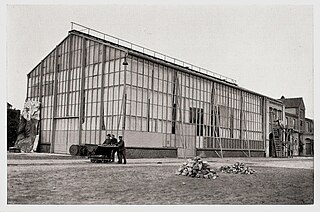
The Terra Studios or Marienfelde Studios were film studios located in the Berlin suburb of Marienfelde.










